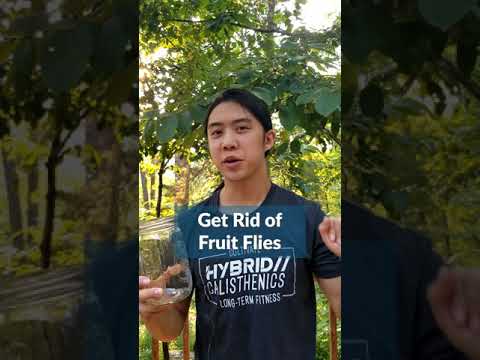Fruit flies can be a nuisance in the kitchen and around compost bins. They feed on the decaying organic matter found in compost, making them difficult to get rid of. Fortunately, there are a few simple steps you can take to help keep fruit flies out of your compost. In this guide, we’ll discuss how to identify fruit fly infestations, what attracts them to compost bins, and how to prevent them from getting inside.To prevent fruit flies from getting into compost, make sure that all food scraps are buried at least 8 inches deep in the compost. Avoid adding too much fruit or vegetable scraps at once and keep the compost bin covered with a lid or tarp. If possible, store kitchen scraps in the refrigerator until they can be added to the compost. Additionally, keep the compost area clean and free of any fallen fruits or vegetables.
Tips For Keeping Fruit Flies Out Of Compost
Composting is a great way to reduce waste and produce nutrient-rich soil for gardening and landscaping. However, if you’re not careful, your compost pile can become infested with fruit flies. Fruit flies are attracted to the sweet odors of rotting fruits and vegetables in compost piles, so it’s important to take steps to keep them away. Here are some tips for keeping fruit flies out of your compost pile:
1. Make sure to break down any large pieces of organic material before adding them to the compost pile. This will make it difficult for fruit flies to lay their eggs in the material and will help keep them away.
2. Keep a tight lid on your compost bin or container. This will help keep out any flying insects that may be attracted to the smell of decomposing organic matter.
3. Add a layer of dry material such as leaves or sawdust over the top of the compost pile. This will create an inhospitable environment for fruit flies and help prevent them from laying eggs in the material.
4. Use diatomaceous earth around the edges of your compost pile or bin. This natural substance is made up of fossilized algae and is effective at killing insects like fruit flies when they come into contact with it.
5. Place yellow sticky traps around your compost bin or container. These traps use pheromones to attract flying insects like fruit flies, trapping them on a sticky surface where they can’t escape.
6. Try using natural predators like spiders or predatory wasps to control the population of fruit flies in your compost pile. These predators feed on insects like fruit flies, helping to keep their numbers down.
By following these tips, you can keep fruit flies out of your compost pile and ensure that it remains healthy and productive for years to come!
Identifying Fruit Flies in Compost
Fruit flies are a common pest in the home and garden. They can be a nuisance, and can even ruin compost piles if not managed properly. Identifying fruit flies in compost is essential for preventing them from becoming a problem. Here are some tips for recognizing and getting rid of fruit flies in your compost pile.
The first step to identifying fruit flies in your compost is to look for the larvae, which will be small white or yellow worms that may be found near the surface of the compost pile. They will often feed on decaying organic matter, so they may be found near any food scraps or other organic material that has been added to the pile.
The next step is to look for the adult fruit flies themselves. Adult fruit flies are typically about 1/8th of an inch long and have red eyes and tan bodies with black stripes. They will often swarm around food sources, so they may be found near any food scraps or other organic material that has been added to the pile.
Once you’ve identified the presence of fruit flies in your compost, it’s important to take steps to get rid of them. The best way to do this is by removing any food sources that may have attracted them, such as overripe produce or other organic material. Additionally, adding beneficial insects such as ladybugs or parasitic wasps can help reduce the population of fruit flies without using harmful pesticides.
Finally, making sure your compost pile is well aerated can also help keep fruit fly populations in check; since they require moist conditions to survive, aerating your pile regularly will help ensure it stays dry enough for them not to thrive there.
By following these steps, you’ll be able to identify and manage fruit fly infestations in your compost pile more effectively and keep your compost healthy and productive!
Natural Ways To Keep Fruit Flies Away From Compost
Fruit flies can be a nuisance when it comes to composting. They are attracted to the smell of decaying organic matter and can quickly overrun the compost bin if not kept in check. Fortunately, there are several natural ways to keep fruit flies away from your compost.
The first step in keeping fruit flies away from your compost is to make sure that all food scraps are covered with a layer of soil or other type of organic material. This will help keep any odors contained and prevent fruit flies from being attracted to the bins. If you have uncovered scraps, try to place them at the bottom of the bin as far away from the opening as possible.
Another effective way to keep fruit flies away from your compost is to add some natural predators such as ladybugs, lacewings, and praying mantis. These beneficial insects will feed on the fruit flies and keep their numbers in check. You can also introduce predatory nematodes into your compost which will feed on larvae and eggs, effectively reducing the number of adult fruit flies in your bin.
You can also use various traps to capture adult fruit flies. Sticky traps work well for this purpose, but you can also make a DIY trap using a jar or bottle filled with apple cider vinegar and a drop or two of liquid dish soap. The soap breaks down the surface tension of the vinegar which attracts the flies, then they get stuck in it and drown.
Finally, one of the most important things you can do is keep your compost bins clean and dry at all times. Make sure that all food scraps are thoroughly covered with soil or other organic material so that there is no risk of attracting unwanted pests like fruit flies. If you notice any signs of infestation, take immediate action by introducing beneficial insects or using traps to reduce their numbers before they become a nuisance.
What Attracts Fruit Flies to Compost?
Fruit flies are attracted to compost because of the abundant nutrients and moisture found within. Compost piles provide an ideal environment for fruit flies to lay their eggs with plenty of food sources nearby. Compost piles are often warm and moist, which makes them attractive to fruit flies. The decaying organic matter in compost also provides a nutrient-rich food source for the larvae of fruit flies, making it a perfect place for them to lay their eggs.
Compost piles can also attract other insects, such as moths, beetles, and wasps. These insects feed on the decaying organic material in the compost pile and can also provide an ideal place for fruit flies to lay their eggs. Additionally, some fruits and vegetables may contain maggots or fly larvae that can attract fruit flies to the compost pile.
Fruit flies are attracted to ripe fruits and vegetables as well as sugary liquids like soda, beer, or wine. Ripe fruits and vegetables that are added to compost piles can attract fruit flies due to their sweet smell and taste. Liquids that are added to compost piles can also attract fruit flies due to their high sugar content.
Organic matter such as grass clippings, leaves, dead plants, manure, kitchen scraps, and newspapers can also be added to compost piles which will attract fruit flies due to the abundance of food sources available. Additionally, if there is standing water near the compost pile or if it is not kept dry enough then this will provide an additional source of moisture that will draw in more fruit flies.
In order to keep fruit fly populations low in a compost pile it is important to keep it clean by regularly removing any debris or rotting material from the pile. It is also important to keep the pile dry by avoiding adding too much water or leaving it exposed too long without covering it up with a lid or other material like leaves or straws which will help keep out excess moisture that could draw in more fruit flies.

Signs Of An Infestation Of Fruit Flies In Compost
Fruit flies can be a nuisance in any compost pile and it’s important to know the signs of an infestation. The most obvious sign is the presence of small, black flies hovering around the compost pile. These flies are usually no bigger than 1/8 of an inch in length and have red eyes. Another indication of a fruit fly infestation is the presence of small white eggs on the surface of food items or along the edges of containers. These eggs are laid by female fruit flies and can hatch within 24 hours.
Another sign of an infestation is the presence of maggots, which are tiny white worms that feed on organic material in the compost pile. Maggots can become numerous very quickly and if left unchecked, can cause serious damage to a compost pile. Additionally, if you notice a strong, unpleasant odor coming from your compost pile, this could be an indication that there is an infestation present as well.
If you suspect that you may have a fruit fly infestation in your compost pile, it’s important to take steps to control it quickly. Cleaning out any decaying material and removing any uneaten food will help reduce the number of available breeding sites for these pests. Additionally, covering your compost with plastic or another type of cover will help keep fruit flies from laying their eggs in it as well as helping to trap any existing flies underneath so they can’t escape and reproduce elsewhere.
How To Get Rid Of Fruit Flies In Compost
Fruit flies are a common problem in compost piles. They can quickly multiply and become an annoyance, but there are several steps you can take to get rid of them. The key is to break the breeding cycle of the fruit flies, as well as reduce their food sources. Here are some tips for getting rid of fruit flies in your compost:
1. Keep your compost pile covered. Fruit flies need a moist environment to breed and lay eggs, so make sure your compost pile is covered to reduce moisture and prevent them from laying eggs.
2. Turn your compost pile regularly. Turning your compost pile will help aerate it and reduce moisture levels, which will make it less attractive for fruit flies.
3. Remove any overripe fruits or vegetables from the compost pile. Fruit flies are attracted to decaying organic matter, so removing any overripe fruits or vegetables from the pile will help reduce their food source and discourage them from laying eggs in the pile.
4. Place traps near the compost pile to catch adult fruit flies. You can make simple DIY traps with items like apple cider vinegar or red wine mixed with dish soap in a jar or bowl, or you can buy commercial fruit fly traps from your local hardware store or online retailers.
5. Use beneficial nematodes to kill off immature fruit fly larvae in the soil around the compost pile. Beneficial nematodes will attack and kill immature fruit fly larvae in the soil, helping to break their breeding cycle and reduce their numbers around your compost pile.
By following these tips, you should be able to quickly get rid of any fruit fly infestations in your compost pile and keep them away for good!
Step 1: Remove the Source of the Infestation
The first step in managing a fruit fly infestation in compost is to remove the source of the infestation. This may include removing any spoiled or rotting fruits or vegetables that may be present. Additionally, you should also check for any other materials that may be contributing to the infestation such as moist organic matter or decaying vegetation. Once these materials are removed, it is important to dispose of them properly in order to prevent further infestations.
Step 2: Clean and Sanitize Surrounding Areas
Once the source of the infestation has been removed, it is important to clean and sanitize all areas surrounding the compost pile. This includes removing any debris from around the compost pile and ensuring that all surfaces are wiped down with a disinfectant cleaner. Additionally, it is also important to ensure that all tools used for composting are thoroughly cleaned and sanitized as well. This will help eliminate any potential sources of new infestations.
Step 3: Cover Compost Pile
In order to prevent further fruit fly infestations, it is important to cover your compost pile with plastic sheeting or a tarp. This will help contain any odors that may be attracting fruit flies and keep them away from your compost pile. Additionally, this will also help keep out other pests such as rodents or birds which can compound an already existing problem.
Step 4: Use Natural Repellents
There are several natural repellents available which can help deter fruit flies from your compost pile. These repellents can include cinnamon sticks, clove oil, garlic cloves, and neem oil among others. It is important to note that these repellents should be used sparingly and only when necessary in order to avoid harming beneficial insects such as ladybugs or bees.
Step 5: Monitor Compost Pile
Finally, it is important to regularly monitor your compost pile for signs of new infestations. If you notice an increase in fruit fly activity around your compost pile then it may be time to take additional steps such as using additional natural repellents or covering the compost pile more tightly with plastic sheeting or a tarp.

Conclusion
Fruit flies may seem harmless but they are a nuisance and can contaminate your compost. Taking preventative measures to keep them away from your compost is the best way to ensure you have a successful composting project. Start by making sure all of your food scraps are either buried or covered in the compost pile. Make sure to turn and aerate the pile regularly. If you already have a fruit fly infestation, try using natural methods such as apple cider vinegar or cayenne pepper to get rid of them. Finally, be mindful of any potential entries they may use to enter your compost pile and cover them up with mesh or screening material.
With these tips, you can keep fruit flies out of your compost and have a successful project that will provide you with nutrient-rich soil for your garden.



